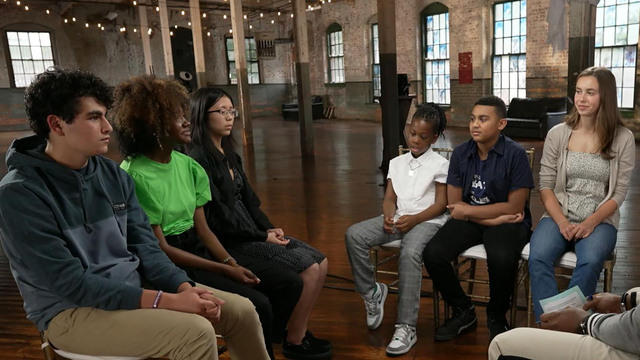▶ Watch Video: Kids on the pressures of having a cell phone, social media at an early age
As more children and teenagers use cell phones and technology, some say the digital world can negatively impact their mental health. Despite the dangers technology can create, young people say social media platforms can be used for both good and bad.
Around eight in 10 parents of children aged 11 or younger say their kids have used or interacted with a tablet computer — a number that has been on the rise in recent years, according to the Pew Research Center. A recent survey by Common Sense Media found that 81% of teenagers aged 13 to 17 use social media, with around 70% using the platforms multiple times a day.
Jade Tam, 16, estimated that she and her friends spent nearly 15 hours on a call during a single weekend.
“Me and my friends, we do a lot of voice calls a lot and we play games and we do study calls,” Tam told “CBS Mornings” co-host Nate Burleson, who joined a panel of other teenagers and children. “We probably do that for a good amount of time.”
The young people said they’ve felt separation anxiety when they didn’t have access to their phones.
“I think I realize how impatient I’ve gotten when I don’t have it and I can’t fill up the time with games or social media or things like that,” Ellie Craige, 18, told Burleson.
Aaron Sillfa, 11, and Naeem Cranston, 8, said they feel as though a part of themselves are missing when they are without their devices. Sam Wallach, 17 said he’s felt nervous without his device, and Tiara Walters, 16, said she’s felt as though she “cannot live without it.”
The group said they feel the need to get their first cell phones as early as elementary school, spurred on by other classmates and friends having one.
Walters recalled that “it was like a competition” to get a phone and said she “definitely was pressured.”
“In fifth grade, literally every single one of my classmates had a phone,” Sillva said.
Around 16% of 1,000 teenagers surveyed by Common Sense Media said they use social media “almost constantly,” while another 22% said they use it several times within a single hour. It’s a figure that’s doubled over the past six years.
Walters admitted she can spend up to three hours at a time scrolling TikTok, adding that relatable and funny content is what keeps her interested for so long.
But the platforms where more and more young people are spending increased amounts of time does come with adverse effects, the young people noted. According to the study, 47% of teens say using social media makes them feel lonely and 59% say it makes them feel depressed.
Tam said comparing herself to others on social media platforms has impacted her viewpoint of herself as an artist.
“I see all these content creators making these gorgeous pieces of art digitally and they’re younger than me, they could be 12, and they’ve already mastered the use of lighting and shading,” she said. “I’m looking at this and I’m like, “Holy crap. Why am I doing this when there are so many other people that are so much younger than me and have so much more potential than me?”
Sillfa said social media users oftentimes “act like they have a perfect life and they’re perfect.”
“They can do what they want. They have all that money and compared to them, I am a nobody,” he said.
Even though Wallach said he understands that social media is often just a person’s digital persona, “it’s hard to realize that it’s not as good as it seems.”
Nonetheless, Walters says social media is “what you make it.”
“It depends on what you allow yourself to see, who you follow and who you don’t follow, what is on your explore pace,” she said.


































